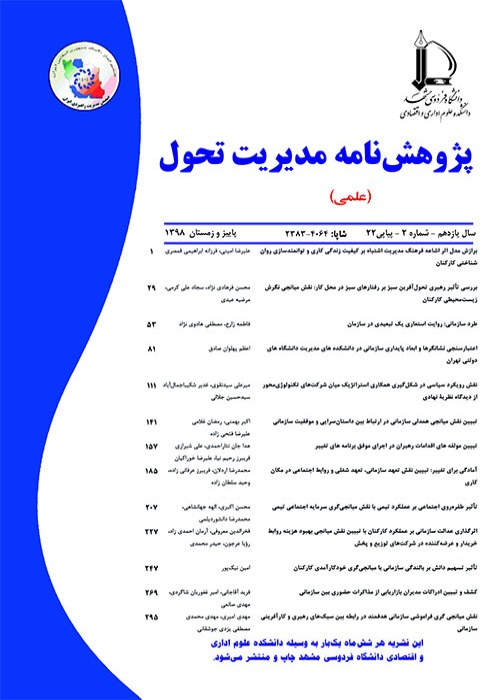Explanation the role of self-efficacy in the relationship between job burnout and psychological empowerment
Author(s):
Abstract:
INTRODUCTION
Job burnout results in deterioration of service quality that provided by staff and it can be an influencing factor in turnover, absenteeism, diminished morale and responsibility. Teachers' jobs are among the jobs that their employees suffer from burnout. Self-efficacy is predicted to be a protective factor against burnout. Self-efficacy of teachers plays an essential role in educating students. Psychological empowerment is also one of the effective factors in reducing job burnout of teachers in order that they believe have the ability and competence to perform their duties successfully. Thus, the present research surveys the role of women's psychological empowerment and self-efficacy on their job burnout in the primary schools of Tabadakan district of Mashhad city.
THEORETICAL FRAMEWORK
The definition of Maslach, Jackson (1997) about burnout is that they considered three dimensions for job burnout, including emotional exhaustion, depersonalization, and reduced personal accomplishment. According to Spreitzer (1995), psychological empowerment includes sense of competence, autonomy, effectiveness, meaningfulness and trust. Teachers' self-efficacy also involves engaging learners, training strategies and classroom management. Accordingly, hypothesizes is presented below:Psychological empowerment has a significant effect on teachers' selfefficacy. Psychological empowerment has a significant effect on the job burnout of teachers. Self-efficacy has a significant effect on the burnout of teachers. Psychological empowerment has a significant effect on the job burnout of teachers through their self-efficacy.
METHODOLOGY
The present study in terms of purpose is applied research. The population includes all women teachers in the primary schools of the Tabadkan district of Mashhad that consist of 2,100 teachers in the academic year of 20112012. The sampling method was simple random sampling method and the sample size which is measured by the Cochran formula was 325 people. In order to measure psychological empowerment, the Spreitzer questionnaire (1995) was used. The teachers' self-efficacy was measured through the Channen, Moran, and Woolfolk (2001) questionnaire and maslach questionnaire is applied for job burnout which all of them used the Likert scale of 5. the reliability of the questionnaires is confirmed by Cronbach's alpha and to assess the validity of the questionnaires, in addition to face and content validity, factor analysis has been used through confirmatory factor analysis and differential and convergent validity. Structural equation modeling using PLS software was used to analyze the data.
RESULTS & DISCUSSION
The findings from the descriptive statistics of the research data showed that most of the teachers were officially recruited and their age ranges from 31 to 40 years. Most of them have a bachelor's degree and a career background of 5 to 10 years. The reliability of the questionnaire and the fitting indicators of the model were also reported as optimal. The results of our assumptions also showed that all of four hypotheses were confirmed. In fact, there is a positive and significant relationship between psychological empowerment and teachers' self-efficacy. There is a negative relationship between psychological empowerment and job burnout among teachers as well as between self-efficacy and job burnout. The role of teachers' selfefficacy interfaces in the relationship between empowerment and job burnout was also confirmed.
CONCLUSIONS & SUGGESTIONS
The purpose of this study was to investigate the relationship between empowerment, self-efficacy and job burnout among elementary female teachers in Tabatakan district of Mashhad city during the academic year of 2016-2017. The results indicate that there is a significant relationship between them. In fact, it turned out that the teachers who are more capable, are more engaged and more motivated and less dissatisfied and discouraged. Therefore, they are less likely to become burnout than other teachers. Also, empowerment of teachers can make them active, responsible and aware of their abilities and competencies, and because they think that they are effective and effecient, they can feel better about themselves and have a higher self-efficacy and teachers with strong self-efficacy beliefs are less likely to be burned out. Given the confirmation of research hypothesizes, it is suggested that the design of teacher empowerment programs be such as to give them greater autonomy. Mid-career training clases for teachers with new training technologies are also recommended to improve teachers' self-efficacy. To reduce the stress and tension in teachers, it is recommended that based on the expertise and experience of teachers, put them at different organizational posts. Also, reducing the number of students in the classroom and expressing modern teaching methods can reduce teachers' burnout.Keywords:
Language:
Persian
Published:
Transformation Managemet Journal, Volume:10 Issue: 2, 2019
Pages:
179 to 202
magiran.com/p1973088
دانلود و مطالعه متن این مقاله با یکی از روشهای زیر امکان پذیر است:
اشتراک شخصی
با عضویت و پرداخت آنلاین حق اشتراک یکساله به مبلغ 1,390,000ريال میتوانید 70 عنوان مطلب دانلود کنید!
اشتراک سازمانی
به کتابخانه دانشگاه یا محل کار خود پیشنهاد کنید تا اشتراک سازمانی این پایگاه را برای دسترسی نامحدود همه کاربران به متن مطالب تهیه نمایند!
توجه!
- حق عضویت دریافتی صرف حمایت از نشریات عضو و نگهداری، تکمیل و توسعه مگیران میشود.
- پرداخت حق اشتراک و دانلود مقالات اجازه بازنشر آن در سایر رسانههای چاپی و دیجیتال را به کاربر نمیدهد.
In order to view content subscription is required
Personal subscription
Subscribe magiran.com for 70 € euros via PayPal and download 70 articles during a year.
Organization subscription
Please contact us to subscribe your university or library for unlimited access!



